Brno's URBACT OnStage Transfer Story
Edited on
01 June 2021How to transfer what participating in the URBACT OnStage network has meant for the city of Brno? Here is the Transfer Story developed by this Cezch city of 381,000 inhabitants.
Brno begins its journey of introducing innovative ways of reaching out to the socially vulnerable through music
There are many ways to go about tackling social segregation in urban areas and its attendant problems and every city needs to follow its own path in solving them. The leading partner of the project OnStage – Music Schools for Social Change – the city of L’Hospitalet de Llobreagat constitutes a quintessential multicultural space. The city mushroomed thanks to three major migration waves throughout the 20th century, which made L’Hospitalet the second largest urban conglomeration in Catalonia. Its proximity to Barcelona shaped its suburban features, along with all the negative aspects of city life: a high unemployment rate, poverty, lower educational attainment, a higher early school leaving, social disparities and ethnic segregation. With about 28% of citizens from a migrant background it is truly a culturally and ethnically diverse space, making the question of social cohesion crucial for the city. One of the urban strategies and policies that L’Hospitalet has adopted and adapted to promote this is the Good Practice of the music school EMMCA (Municipal School of Music and Arts Centre). Based on the idea that cultural and artistic expression is a citizenship right, EMMCA has been providing educational programmes in deprived areas, proving that using music and performing arts as a tool to foster social cohesion is a successful practice.

—compared to L’Hospitalet, Brno constitutes a fundamentally different urban space
The second largest city in the Czech Republic has been traditionally one of the main economic, scientific, educational and cultural centres. A very low unemployment rate, low poverty, high school attainment, low early school leaving and a city without a large population of migrants and minorities make Brno’s citizens a much more homogenous population. But nothing is ever black and white. Despite the low poverty rate overall, Brno has identified 16 areas with a risk of social exclusion for their inhabitants. These areas are mostly located in the vicinity close to the city centre, populated by 12 – 15.000 citizens who are mostly Roma people – the major ethnical minority in Brno. There are a number of non-profit and other organisations in the area which provide cultural and educational programmes for this community. The city of Brno, acting as a patron, co-finances the efforts of these institutions in the framework of the regular organisation of specifically focused programmes and events. The local primary schools organize a plentiful array of afternoon activities for the students and with a strong network of state primary music schools (ZUŠ), with a school in every area of the city, all children have access to music education. At first sight, these cultural and educational efforts in these localities should be able to provide enough educational and cultural support for the local community.
… So why would the practices of EMMCA in L’Hospitalet be of interest to Brno? What are we still missing?
The answer is simple, we don’t have any music programmes such as EMMCA organizes. It is a paradox, because state basic school (ZUŠ) offers high quality music education at affordable rates for any applicant, including people on social benefits (€ 80/semester, 90min/week). It may give the impression that there is no need to adapt another system of music education, since there is already a well-functioning one with an illustrious tradition that has proven to be highly efficient. With a school located in every part of the city, music education is very accessible. And yet, there is a group of children who are traditionally left behind – children from socially challenged backgrounds. They usually don’t enrol, perhaps because they simply don’t see benefits of it or because they may be intimidated by the rigour that this version of musical education and its institutions seem to demand. The basic goal of music education is primarily designed to prepare students for the conservatory, which opens for them the opportunity to pursue a professional career in music. The philosophy of this approach is to reach mastery – to assess the individual needs of any student and efficiently develop their full musical potential. That is the prevailing opinion about how to teach music and why. Teaching music to enhance social cohesion is a concept little known throughout the Czech Republic and its potential has hardly been explored so far. Being a part of the project OnStage gave us a chance to change this.
The story of Brno’s two-year journey is about approaching people living on the margins of society through music.
We have decided to learn from the experience of L’Hospitalet and bring music to them, into their schools and community.
We are learning, thinking and planning
After a half year of preparations, we established Brno’s ULG that had its first official meeting on the 16th of January 2019. We were glad to see that the project brought together a wide variety of stakeholders, including representatives from the municipality and the region, all local non-profit organisations and schools situated in the target areas of the city. That was very good news for the project right from the start. Gathering such an alliance was promising not only in support of the project during its official duration, but it could also become a crucial player for assuring the project’s sustainability after its official conclusion. The diversity of the ULG‘s members also meant we could gain insight into the specific problems of social exclusion and policies to counteract them from different perspectives. This proved to be of utmost use when we were creating our Transfer Plan.
The ULG was enthusiastic about the project. People were convinced that Brno is prepared for such challenge, as Marie Jílková (Member of the Brno-centre District Council) concluded:
“In the beginning it seemed that Brno has all the external conditions set for a structural change that the Good Practice from Spain offers; an advantage is a large number of agents (the Pedagogical Faculty, JAMU (Janáček Academy of Music and Performing Arts), the Municipality, the primary music school and non-profit organisations). “
Of course, there were also serious doubts. Based on previous experience with project implementations, some stakeholders weren’t sure whether our efforts would get passed the planning stage, as Ondřej Fišer (Coordinator for National Minorities, South Moravian Region) said:
“I have heard people outside the project saying that it would probably raise interest, but it would drop fast. That was my biggest concern, that yet another project is starting which won’t have any real impact on the target group.”
Nevertheless, the main concern, the quintessential question of success for any project, remained the question of funding: even if we envisage a way to adapt Spanish Good Practice in Brno, could we put it into practice as well?
Luckily, our work on the Transfer Plan in the following three months was not in vain. Brno’s municipality decided to fund the project with additional two million Czech crowns. With all the theoretical knowledge we had gained and the practical demonstrations of group music education we had seen at Transnational Meetings (Grigny in January, Brno in April, Aarhus in June) we were ready to start our own music programmes in Brno. We had enough finance for their implementation in two primary schools located in deprived areas of the city.
Based on the experience of the Good Practise that we had observed on our visit in L’Hospitalet in the preparatory Phase 1 in 2018, we were inspired to introduce educational music programmes similar to the ones we had seen in EMMCA. The music school EMMCA operates in the economically-deprived areas of city by offering group classes to all citizen in its main building and carrying out curricular music classes for primary schools – a programme called TANDEM. For Brno’s urban context TANDEM was of great interest because it carries out music and performing arts lessons directly at the grass roots in the chosen primary schools. These schools are categorized as “High Complexity Schools”, because a large percentage of their students come from low-income households, most of them with a refugee or migrant background. Providing free group music lessons there has proven to be very useful: students involved in EMMCA’s programmes had better results in exams, especially in mathematics, than students from similar schools that had not participated in the programmes, and early-school leaving decreased.
In Brno we have identified 10 primary schools with a high number of socially disadvantaged students or students from different ethnic backgrounds. Even if early school leaving is extremely low across the region (2,7% of students in the NUTS II Region), expert estimation states that 78% of Roma children leave school at a preliminary stage.
We are starting
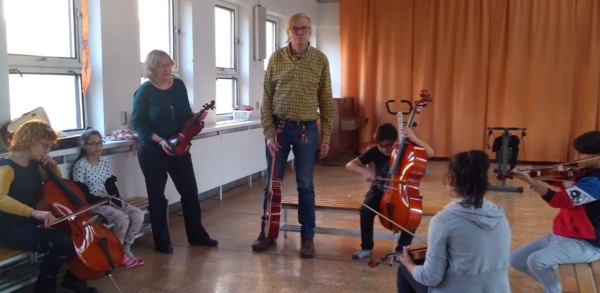
Brno’s first piloting programme began in September 2019 in the primary school ZŠ nám. 28. října. The school extended the morning curricular programme with an extra music lesson for 5th to 9th grade classes. These lessons give students an opportunity to create a deeper connection with music and motivate them to participate in the main music programme – group violin and cello lessons, which became part of the voluntary afternoon school curriculum (3x2h/week). The majority of the students in this school are Roma children, whose cultural tradition is deeply connected to playing music. The older generation of Roma people, especially, still own a musical instrument and can play it. Nowadays, this rich tradition isn’t as conspicuous as it used to be but the positive feeling for music is still present, as Alena Tomešová, the violin teacher, concluded:
“Their incredible musicality surprised us, even though we had been expecting it. It is a gift whose value they probably even don’t realize. They have such an obvious certainty of rhythm, ability to intonate, and once holding the instrument they express such a confidence and easiness. The direct encounter with this talent amazed us.”
Alena leads the music lessons with her brother Jan Škrdlík, the cellist. They are both experienced teachers and yet this programme is quite challenging for them, because figuring out ways to approach the children with music in a group requires a lot of insight, sensitivity and expertise. Luckily, at the very beginning of this programme Jan, with two music teachers from the morning timetable, could participate in the first teachers’ visit to Spain organised by L’Hospitalet in October 2019. This on the ground experience proved invaluable not only because the teachers saw group teaching in practice, but also because they got a chance to exchange experience about working with Roma children. His experiences from this professional excursion are described by Jan in his diary entry:
“The common feature of all the lessons was a minimal stress on theoretical knowledge, learning skills by imitation, inventiveness and good planning of the lesson. Even though the level of students’ performance was relatively low, all students apparently were enjoying the lessons, because we didn’t see any bored faces.”
“I learnt that in L’Hospitalet there is a large Roma community, but any cooperation hasn’t been successfully established so far. The reason is the problematic attendance of Roma students and their volatility. This last piece of information I take as a valuable lesson and also as a warning in the context of my current work in Brno. As great as the content of the lesson may be (even though it is a big asset) in the case of Roma children it doesn’t guarantee success. It seems that this kind of work (to be successful) requires indispensably to combine the teaching process with social work and communication ideally on the family level.”
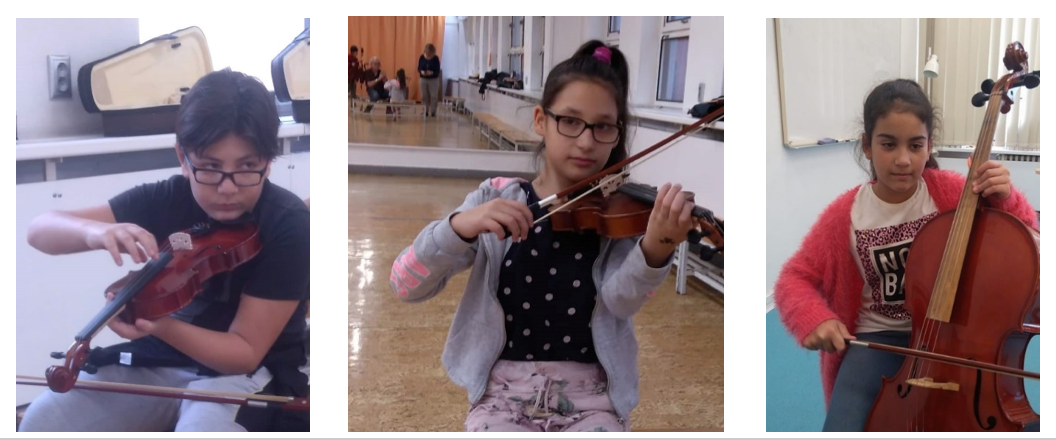
Music for the youngest
In September we also started another music programme. In our target area a newly opened kindergarten, MŠ Sýpka, decided that one of the three classes would specialize in musical education. In cooperation with the school, we set up a weekly group music programme and purchased musical instruments.
Since its beginning the idea of music classes has been attracting a great deal of interest on the part of parents and it became very popular with the children. We hope that our programme will help to improve the reputation of the school in the minds of the broader public, so the kindergarten can become a space open to social cohesion for the youngest citizens in one of the most deprived areas of the city.
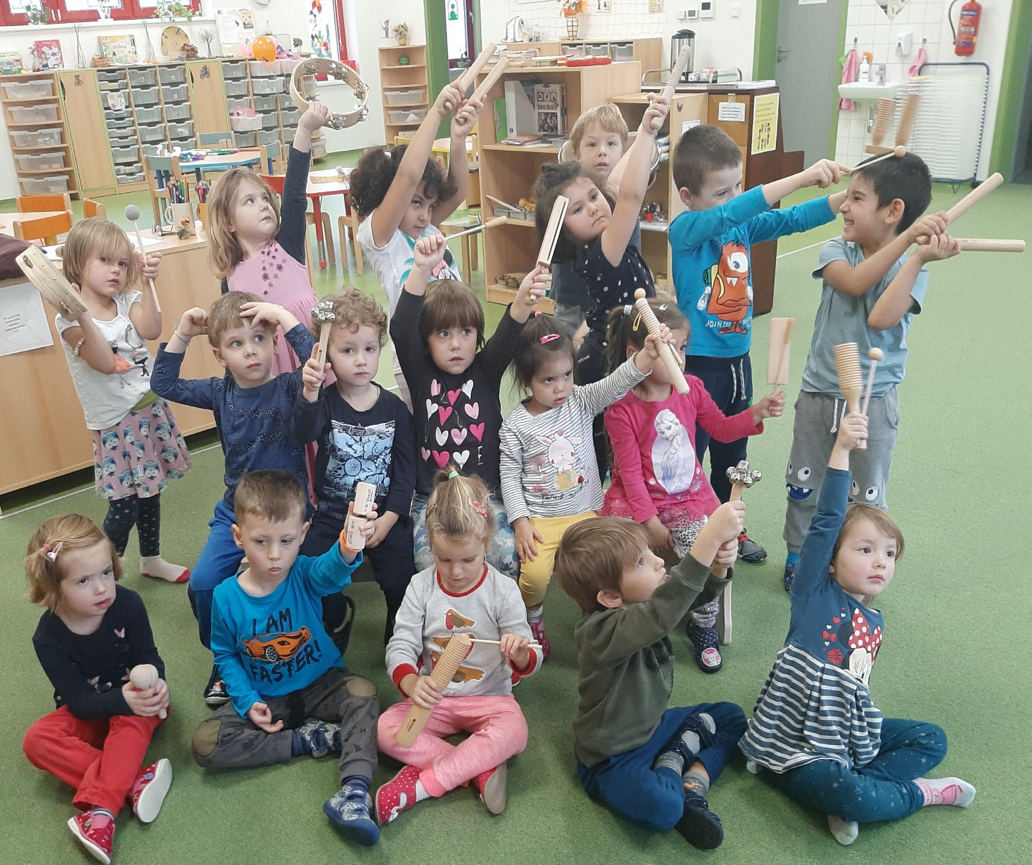
First small big victories
In November and December, the project started to find its tempo. The piloting programme for violin and cello met with an initial success. Only after two months of practising some of the students were able to play at Christmas school performances and according to Jan, the cello teacher, it was a positive experience:
“The performances were successful, though the children were nervous to begin with, but after they were truly proud of themselves. After the performances their attendance increased. We realized how much it motivates them to play more. “
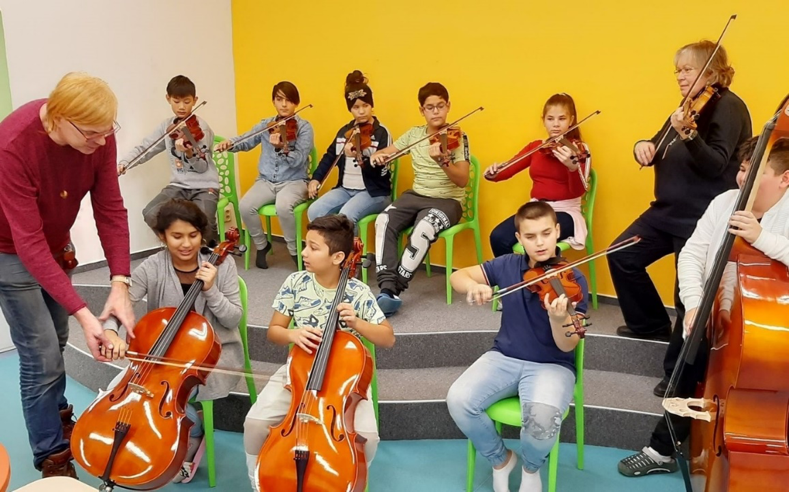
We are reaching the community
At the end of November, a community choir ONSTAGE was established. Free of tuition, the choir aimed to be open for anybody with or without any musical experience. We believed that a broad repertoire – popular song, gospels and traditional Roma songs and no age restriction (children from the age of six, teenagers and adults) was a promising concept for creating a community space where local people could meet and share the joy of making music together, and get to know the richness of the Roma’s musical culture, as said Petra Borovičková, the choir master:
“We are creating our own methodology tailored to our needs. We don’t use sheet-music, we are trying to build relationships! We believe in the attractiveness and vivacity of the Roma repertoire. We have Roma and non-Roma singers of all ages. We are growing and we enjoy it.”
The choir was a result of cooperation with the local non-profit organisation IQ Roma Servis and a partner primary school ZŠ Merhautova. The idea to connect all local organisations and institutions which coexist, but don’t at present directly cooperate, came as one of the early suggested aims at the first ULG meeting. There are a lot of agents positively engaged in social cohesion, so bringing them together can only support their efforts and open up new possibilities for the area.
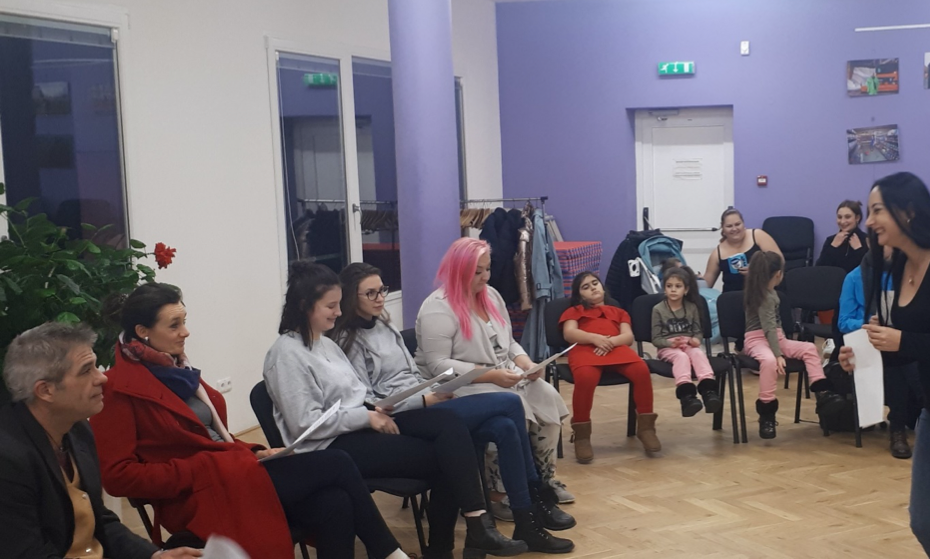
First uncertainties
November and December was also time of searching. We were looking for guitar teachers for the second music programme in the primary school ZŠ Merhautova and we were looking for members for a community band that we wanted to establish. These didn’t seem like difficult tasks and yet we encountered some problems. In both cases, finding suitable people reflected the current situation in our city very well.
The fact that we had found teachers for our first piloting programme so quickly seemed to us now more like luck. From the brainstorming exercise at TNM in Katowice and the following ULG meeting we learnt that our ideal music teacher would be a person with not only musical and pedagogical skills, but also somebody experienced in social work and psychology, and last but not least, somebody who can teach music to children in groups.
As mentioned above, in the traditional Czech philosophy of music education there is no such concept as a group music lesson. Teachers have a tendency to think in terms of individual needs and orientate their efforts towards the intensive one-to-one efficiency of the learning process and the desire for perfection on the part of the student. The ‘El Sistema’ method, which is the main methodological inspiration for music for social change in EMMCA and in our programmes, is almost unknown here. Except for Foundation Harmonie in Prague and the association Vějíř in Kladno, where they have already introduced it, in the Czech Republic there is no theoretical or practical base for this way of teaching. Hence, our teachers had to jump into deep unknown waters and start teaching with a superficial knowledge of group music methodology, as concluded Rostislav Vintr, our guitar teacher:
“I am a former student of a basic music school (ZUŠ) and the conservatory and I had no experience with group education. I was worried that to keep discipline necessary for the teaching in a group would be difficult if not impossible. I also didn’t believe that it is possible to reach a good level of managing the music instrument in a group lesson. But after another dialogue with the project co-ordinator Pavla Lukešová I started to understand that the goal of this project is not “to get children accepted to the conservatory “, but to positively influence children from a specific social group with integration into society and also show them “different values “. Finally, with mixed feelings, I accepted the teaching job offered. “
Our second challenge in the last two months of 2019 became the search for members of a new community band. Our goal to create a music community based on the cooperation of existing institutions, schools and non-profit organisations operating in our target area had its first results. The community choir ONSTAGE connected the primary school ZŠ Merhautova and NGO Roma servis. The community band would connect the primary music school ZUŠ Vranovská and primary school ZŠ Merhautova. It seemed to be the last missing piece of a puzzle we were trying to put together. The band was meant to bring music not only to the students at the primary schools, but also to their parents or friends – to the broader community. Anybody with sufficient skills to play any instrument could come and with the help of two professional musicians would find a suitable repertoire. But once we were looking for potential members we realized how difficult it is to attract people from the community who aren’t already somehow involved in ongoing activities. Sadly, despite our best efforts we didn’t manage to attract any children or adults to truly commit to the band before Christmas.
New Year means new beginnings
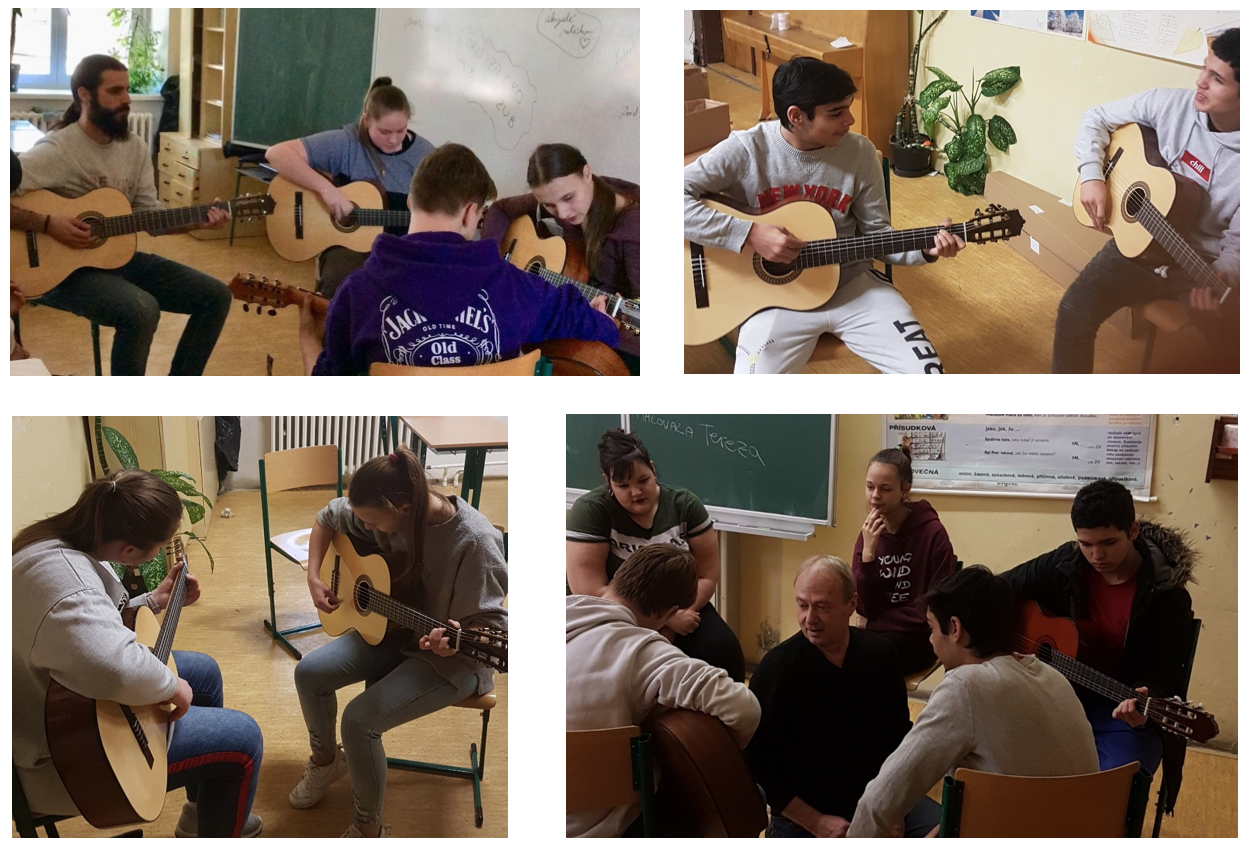
In January 2020 we opened the second music programme in the primary school ZŠ Merhautova (3x2h/week). We had succeeded in hiring two guitar teachers who were willing to try to teach in a new way. The timing was perfect again, because the very same month we could send both teachers on teachers’ mobility organised by the partner city Grigny. This experience not only dispelled some doubts they still had about the new methodology, it also made them truly excited about the project, as said José del Castillo Blasco, guitar teacher:
“I must say that we (Rostislav and I) were the newest ones, and probably the ones with least knowledge about the whole project, which was a good thing because this trip to France was all about learning! Firstly, learning with my own eyes how this whole concept of music for social change and better cities works; a concert with a full concert hall, I had to sit on the ground for the lack of seats, a normal Thursday with all those kids and teenagers playing and singing beautiful music was the pure example (a beautiful one) of how it works, especially taking into consideration the rates of criminality and vandalism in the area, how ten years of music (and a professional approach) can change things; and seeing this changes people. Secondly, learning how to work with groups was important. I took so many ideas about how to teach some things in groups in a better way.”
An unexpected twist in the story
In the spring of 2020, we were more than happy to see that our programmes were well established, so we could collect the first fruits of our efforts – we started to look for opportunities to promote our activities and find cultural venues where the students from our project could perform. Unfortunately, on the 16th March 2020 the Government of the Czech Republic announced a quarantine due to the pandemic of Covid-19. Any collective activities were banned. Schools were closed and wouldn’t reopen before the summer holiday. All education switched on-line. Our music programmes couldn’t that easily use the on-line option because students only had musical instruments at their disposal during lessons at schools. Thanks to the prompt action of the music teachers and the management of ZŠ Merhautova, students could borrow the instruments and take them home and the programme continue, in some limited ways, on-line.
The choir ONSTAGE also found its way. Facebook posts with recorded new songs to learn kept the choir alive so it didn’t lose its continuity and could pick up its threads after the quarantine in June. Unfortunately, all other activities had to be cancelled till the summer.
The confinement itself slowed down the whole process of the transfer. Nevertheless, we could see that just a few months of ongoing activities made the implementation successful. A very good piece of news for us was the fact that the project was extended by half a year due to the pandemic situation. We focused on the fall semester, promoting the project and finding new liaisons, hoping that the second wave of the pandemic in the autumn wouldn’t come.
We are starting over again
September 2020 meant for us the second year of our music programmes. Our teachers promoted them by visiting music classes in the morning curriculum of our partner primary schools, enthusing the children with the musical opportunities on offer. In ZŠ Merhautova, 37 students signed up for guitar lessons, which was four times more than the previous school year. The violin and cello programme in the primary school ZŠ nám. 28.října attracted back the steady core of the students from the previous year and got some newcomers. We were ready to rise and shine again! Unfortunately, on the 12th October the government announced another lockdown. Some of the project programmes had already learnt to survive during the first confinement, so they switched to an on-line existence more smoothly than before, but other activities had to be cancelled for the moment completely.
The end of the story?
At this moment, it is very difficult to predict the future of the project. Yet, in a very short period of time, we have proven that this project is meaningful for Brno and could make positive changes here. Our Transfer Story is that of a journey to discover new ways of teaching and learning music and mostly rediscovering the amazing quality music has – its ability to connect people.
We would like to see this moment not as the end of the journey but as its beginning, because the experience we have already gained we can’t forget. We will look for ways to continue on the innovative and exciting path we have already taken.
Submitted by c.salido on

